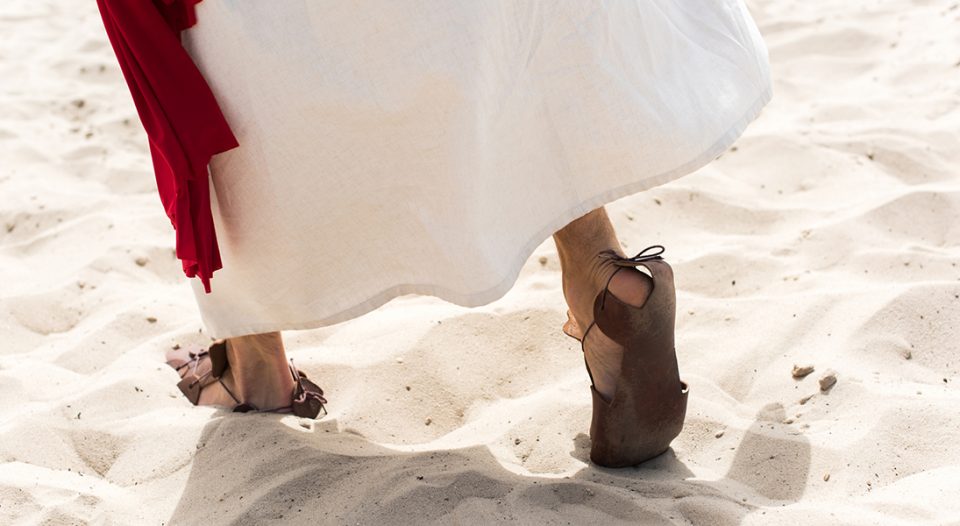Lectionary for June 26, 2022
Third Sunday after Pentecost
1 Kings 19:15-16, 19-21; Psalm 16;
Galatians 5:1, 13-25; Luke 9:51-62
When I must do difficult things that I’m not looking forward to, I can be pretty grouchy. I was on the phone with customer service for three hours the other day, trying to rebook tickets after my flight was canceled. As a result, I raised my voice to my kids who were doing nothing wrong, other than making noise during the eternity that I was waiting for a travel solution. Where I was grouchy with my kids because of a long phone conversation, Jesus was kind to those who approached him, even as he walked to his death.
After Jesus decided to head toward Jerusalem to be “lifted up,” he sent messengers on ahead to prepare a place for him in Samaria. Now, the Samaritans had an alternative worship site to the Jerusalem temple on Mount Gerizim. They thought the Jews who worshiped in Jerusalem were, at best, misguided. After all, hadn’t Moses identified Mount Gerizim, rather than Mount Zion, as the mountain of blessings (Deuteronomy 11:29)? Frequently, Jewish pilgrims from Galilee took a longer route around Samaria to avoid confrontation with the Samaritans and the potential of contamination by the ickiness they associated with that population’s religiosity.
But Jesus wanted to go to Jerusalem on a direct path and passed through Samaria. The Samaritans, however, weren’t interested in playing host to another Jerusalem-bound pilgrim and denied him and the disciples hospitality. Incensed, James and John asked Jesus if they should call down fire upon the unwelcoming Samaritans. No doubt the disciples were thinking of Elijah calling down fire on the servants of Samaria in 2 Kings 1:9-15. Jesus had other ideas, however, and rebuked his disciples. Seeing that at least a couple of his disciples viewed him as a reborn Elijah, Jesus used the next interactions he had with people on the way to Jerusalem to compare himself with that prophet of old.
When someone told him he would “follow you wherever you go,” Jesus replied that foxes have holes and birds have nests, but the Son of Man has no place to lay his head (Luke 9:57-58). Jesus was probably referencing the time when Elijah sent away his servant and went into the wilderness to die, despairing of God’s protection and provision. Yet, even in the desert God provided a broom bush under which Elijah could lay his head (1 Kings 19:3-5). Unlike Elijah, Jesus had not given up hope of God’s salvation, and, unlike Elijah, he had no place to lay down (no Samaritan hospitality).
In a tense time, on his way to his own death, Jesus conducts a walking Bible study to refute assumptions about who he was.
Jesus then commanded another person to follow him who apparently responded in the affirmative but requested to be allowed to bury his parent first. Jesus said the dead should bury their own dead and ordered the person to go and proclaim the kingdom of God (Luke 9:59-60). I wonder if Jesus is alluding to the sordid tale of Ahab, Jezebel and Naboth, where jealousy over a vineyard led to false accusations, murder and, ultimately, the end of a powerful dynasty (1 Kings 21).
In that story, God announced through Elijah that Ahab and his entire family would be killed because of his great evil. When Ahab repented, God told Elijah that the disaster would come not during Ahab’s reign but that of his son, Jehoram. While Jehoram was a better king than his father and had removed the pillar of Baal that Ahab set up, in the end he was killed because he continued in the Samarian idolatry of his ancestors (2 Kings 3:1-3). In other words, Jehoram waited too long to bury the ways of his father and start working for the kingdom of God. Jesus didn’t give his potential follower along the road the opportunity to make the same mistake as Ahab’s son, and instead told him to get to work immediately spreading the kingdom of God without waiting to bury his father.
Lastly, another person asked to follow Jesus but wanted to say goodbye to his family first. Jesus said, with a twinkle in his eye no doubt, that no one who puts his hand to the plow and looks back is fit for the kingdom of God (Luke 9:62). This is an allusion to the call of Elisha, Elijah’s disciple. The joke is, of course, that Elisha had his hands on the plow and looked back to his family when Elijah called him (1 Kings 19:19-21). But instead of not being worthy of the kingdom of God, Elisha outshone even his master Elijah.
When Elijah tried to retire from prophethood on Mount Horeb, God told him to anoint three people: Hazael of Damascus, Jehu of Israel and Elisha (1 Kings 19:15-16). Elijah anointed none of them but merely tossed his cloak on Elisha callously without stopping (1 Kings 19:19). Elisha completed Elijah’s tasks, however, informing Hazael on a trip to Damascus that he would become king (2 Kings 8:13) and causing Jehu to be anointed King of Israel (2 Kings 9:1-6). Jesus was pointing out, as a joke for those who catch the reference, that the one who has second thoughts at the beginning of ministry might be the same disciple who outshines the master.
In a tense time, on his way to his own death, Jesus conducts a walking Bible study to refute assumptions about who he was. James and John wanted to call down fire on folks from Samaria, like Elijah had centuries earlier. Instead, Jesus pointed out that, unlike Elijah, he had not given up hope for the salvation of the people, that he would not abandon the people to perdition and, most important, that he doesn’t give up on folks when we have second thoughts about following him.





